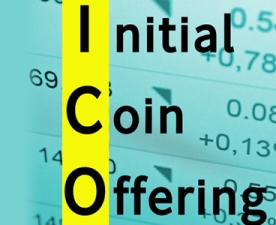ICOs have become a hot topic lately as a new means of raising funds. While there are many cases that have successfully procured a large amount of funds through ICOs, it is apparent that they have become something of a speculative boom. This article will outline ICOs and their merits, and further discuss issues regarding ICOs.
What is a Token ICO?
Projects that want to raise funds can independently issue tokens on their blockchain and sell them using an ICO.
The term is derived from the more traditional method of selling shares through an IPO (Initial Public Offering). During an IPO, a company offers returns such as dividend and management participation rights to shareholders, whereas in an ICO anybody with the technology can issue and sell tokens, so it is not limited to listed companies. There are examples of successful ICOs by a single individual all the way to international corporations. ICO is sometimes referred to by the alternate terms “crowdsale,” “pre-sale,” or “token sale.”
ICO are particularly popular in blockchain related projects, and development proceeds based on the funds procured. Many of the tokens sold at a certain amount by ICO will become tradeable at market price on digital and traditional exchanges after the ICO closes.
The Core of ICO Tokens
First of all, what are the unique characteristics of tokens sold through ICO and their returns?
In a standard ICO, tokens that can be redeemed for a future service are sold. If the appeal of the proposed service is sufficiently high, buyers can assume that the value of tokens will rise on the exchange.
There also are numerous cases of projects raising funds with tokens that offer “voting rights” - that is, holders can participate in decision-making through majority votes on smart contracts, receive commission income in services through “dividend rights,” etc. In this sense, tokens are similar to stocks.
ICOs Merits and Risks
ICO is a revolutionary process wherein anybody can raise funds, either through a secondary distribution (such as transfer, trade, etc), as well as stocks. Additionally, there are many innovative projects related to blockchain which are garnering keen interest from investors.
Since expectations are so high, many purchasers are aiming to garner gains through speculative investments, and many projects are reaching their set target procurement before the end of the ICO period. “Encryption currency,” “Cryptocurrency,” “Blockchain,” and “ICO” have all become buzzwords. As a result, investment in cryptographic currency as a whole is experiencing a sudden boom and currently there is a lot of market volatility. Yet detailed research on each project and analysis on future prospects is insufficient.
As expectations for the future of blockchain rises, investors need to understand both the pros and cons of ICOs.
One of the major risks is that transparency of the development team’s status is not guaranteed, and it is impossible to know how system development is progressing. Since purchasing tokens in an ICO is a contribution to projects and development organizations, investors should always read the whitepaper and periodically confirm the development situation. Moreover, it is necessary to make educated decisions as to whether the ICO implementing entity is reliable without being deceived by information from the Internet.


